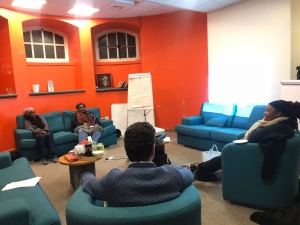 Frankie Webster co-ordinates our community organising lay leadership programme, the Wagstaff Course. She writes about what she has learned while training new leaders over the past year.
Frankie Webster co-ordinates our community organising lay leadership programme, the Wagstaff Course. She writes about what she has learned while training new leaders over the past year.
If you look up the word leader in most dictionaries, it is defined as a person who leads a group of people. Someone with a following. This challenges the common idea that some people are just ‘natural’ leaders with X leadership qualities that most others do not possess. It means that bar Jesus, leaders are made not born, and therefore we can be leaders too.
Leadership as action not position
If leaders are those with a following, that means they have power. Good leaders are measured by how they use their power and where they lead others. Are they developing a following to share power with or to have power over? In community organising we talk a lot about having a “relational” model of leadership. In church we might think of leaders as being kind when they relate to others amicably. But we must be more demanding: there is nothing kind about a model of leadership that fails to develop others, and keeps power in the hands of a favoured few.
The core focus of the Olive Wagstaff Course is to train congregational leaders across east London churches in the practice of community organising. As lay leaders participate in the programme, they develop as relational leaders – leaders with a following of people who are in turn understood to be potential leaders that they are responsible for developing. And so, like a snowflake, one leader develops another who develops a few others and on it goes.
In the course of the programme, we grapple with questions like: Who currently leads in church? Who are the truly relational leaders? What untapped leadership lies in people who are unrecognised or underestimated? How can our churches be transformed by this type of leadership model?
Here are some insights that we have been reflecting on…
Unlikely leaders
The programme was built in the recognition that lay leaders are often the most relational. The clergy may not be the people with the largest following in a congregation! I have personally been part of congregations where one of the most unceremoniously blunt elder congregants was one of the most relational leaders. The depth of relationship with other parishioners meant both challenge and support were seen for what it was; true kindness that sought growth for those who ‘followed’ them.
Theology from the pews
Rooted in the tradition of community organising, much of the course is based on stories of social change led by ordinary citizens; some from the Bible and some from east London. One such example can be found in St Stephen’s RC Church in Manor Park, whose parish was one of the worst affected by the pandemic. Lay leaders trained on the Wagstaff course began a regular Friday night Rosary group for anyone needing space to lament. One such leader, Susan Greaves, reflected on how parishioners supported each other, describing the weekly Rosary as a process of re-centring themselves on those most affected by the pandemic – “indirectly we are Jesus, so if a stranger rocks up at church and we say you are not welcome here – you are turning away Jesus himself or herself”.
 Another example is the organising work of the cohort from On the Rock International Ministries based in Marksgate, Dagenham. Parishioners developed a core team to meet immediate needs of isolated members of their estate during the pandemic. While building relationships and having intentional one-to-one conversations they discovered and developed new leaders both within the church and beyond with other local residents, and are now developing core teams to work on youth safety and settling the status of people living without documents in their community.
Another example is the organising work of the cohort from On the Rock International Ministries based in Marksgate, Dagenham. Parishioners developed a core team to meet immediate needs of isolated members of their estate during the pandemic. While building relationships and having intentional one-to-one conversations they discovered and developed new leaders both within the church and beyond with other local residents, and are now developing core teams to work on youth safety and settling the status of people living without documents in their community.
Stories of change rooted in the experience of east London Christians are both the inspiration and the fruits of the programme. We see that just as in biblical times, God continues to reveal himself through ordinary citizens, and often through unlikely leaders. As Oscar Romero so aptly put “Gloria Dei, vivens pauper” (the glory of God is the poor person who lives), we see and learn that out of some of the poorest communities a breadth and depth of tacit understanding of God and where He is moving through the local organising work.
Developing a plan for lay leadership development
For all of us, the process of recognising and developing our own leadership is a process of becoming more ourselves or ‘coming into our own’. So it’s that easy, and that hard. Discovering your leadership and ‘going public’ with this involves revisiting the experiences that have formed you and which motivate you to organise. In order to organise well with others, to tell our stories publicly to decision makers and to hold the powers that be to account, we must first address what Richard Rohr calls our ‘sacred wounds’.
These wounds can transform us, making leaders who develop others to build enough power to make change with others. For many involved in community organising this may be the first time anyone has asked them to step into leadership, and share their story publicly. If we are to sustain the work of community organising in our churches long-term we must be intentional and patient about this journey of leadership development. Many of our lay leaders will have experienced great injustice, and are the future leaders in our not-yet-told stories of social change. We must make it our first priority to develop a relational model of leadership that is rooted in a desire to share power and create change with (and not just for) the underestimated and overlooked leaders who are already in our midst.

Leave a Comment